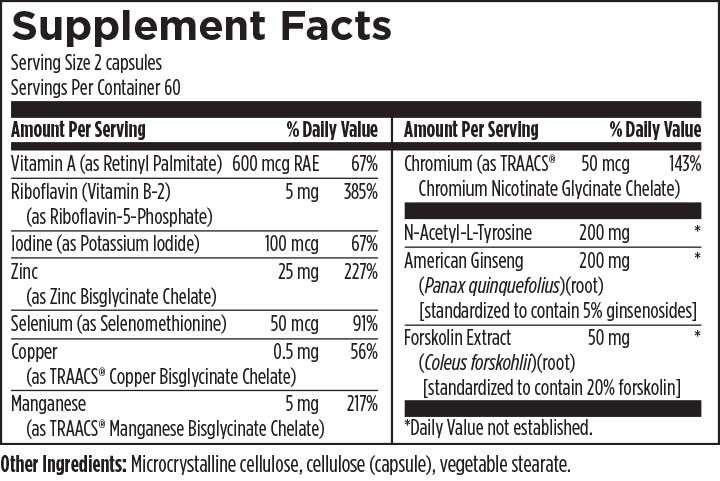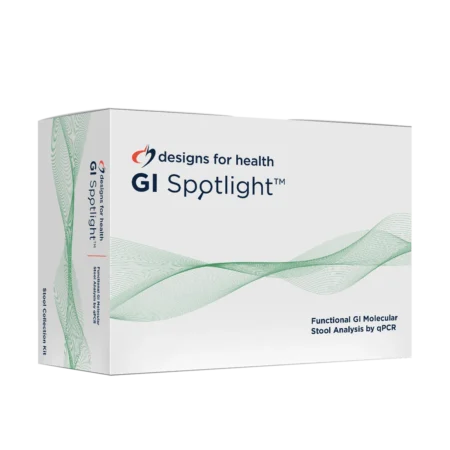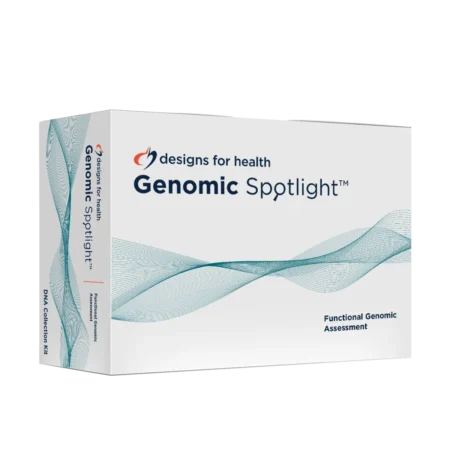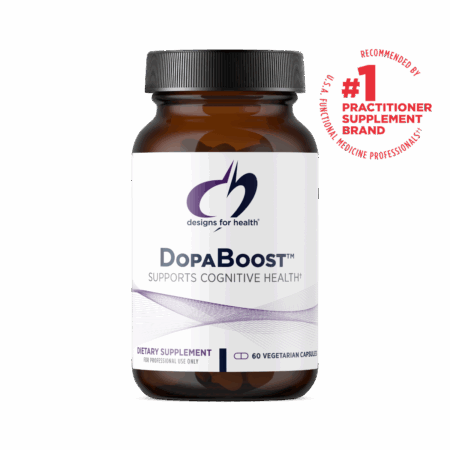Description
Nutritional Support for the Thyroid Gland
THIS INFORMATION IS PROVIDED FOR THE USE OF PHYSICIANS AND OTHER LICENSED HEALTH CARE PRACTITIONERS ONLY. THIS INFORMATION IS INTENDED FOR PHYSICIANS AND OTHER LICENSED HEALTH CARE PROVIDERS TO USE AS A BASIS FOR DETERMINING WHETHER OR NOT TO RECOMMEND THESE PRODUCTS TO THEIR PATIENTS. THIS MEDICAL AND SCIENTIFIC INFORMATION IS NOT FOR USE BY CONSUMERS. THE DIETARY SUPPLEMENT PRODUCTS OFFERED BY DESIGNS FOR HEALTH ARE NOT INTENDED FOR USE BY CONSUMERS AS A MEANS TO CURE, TREAT, PREVENT, DIAGNOSE, OR MITIGATE ANY DISEASE OR OTHER MEDICAL CONDITION.
Like all of our glands, the thyroid needs supportive nutrients from food or supplements to act as raw ingredient precursors for its proper function. Thyroid Stimulating Hormone needs to give the cells a message to synthesize thyroxine. Thyroxine, known as T4, needs to be converted into active T3. Cortisol and insulin levels need to be controlled in order for this to happen successfully and precursors and coenzymes must be available.
Supportive Herbs: American Ginsengroot And Coleusforskohlii (Forslean®)
The non-stimulating adaptogenic botanical American Ginseng (Panex quinquifolius) helps control variations in cortisol. These variations can have profound deleterious effects on peripheral thyroid hormone conversion, as well as serum blood glucose and insulin levels, inducing dysglycemia and laying the foundation for metabolic syndrome.
Why Is Coleus Forskohlii Extract Necessary for Thyroid Support?
Coleus forskohlii is necessary for several reasons. Its active constituent forskohlin is a diterpene from the roots of Coleus forskohlii, known to directly activate the adenylate cyclase enzyme and raise cyclic AMP levels in many tissues. This is important because Thyroid Stimulating Hormone (TSH) stimulates all steps in the synthesis and secretion of T3 and T4. The first step is the binding of TSH hormone to TSH receptors located on the basal membrane of thyroid epithelial cells, followed by elevation of cyclic AMP levels, and a subsequent cascade of phosphorylation reactions via activation of protein kinase A. The final step is the secretion of thyroid hormones T4 and T3 which again could not happen without cAMP. Hypothyroid patients need support in the area of fat metabolism. Coleus is known to reduce adipose assimilation and increase the lipolysis of fats. Coleus aids in the following functions:
1) Inhibiting the synthesis of adipose tissue
2) Increasing response to lipolytic hormones, which are produced in less quantity as we age
3) Utilizing stored fat. It may also play a role in aiding he production of digestive enzymes and supporting the immune system, both of which are helpful for hypothyroid patients.
Tyrosine, Copper and Coleus Forskohlii
Cyclic AMP, copper and tyrosine are involved in the production of “feel good” catecholamines such as dopamine and norepinephrine. This could be very helpful since hypothyroid patients are so susceptible to depression. Cyclic AMP is also a key player in regulating steroid hormone synthesis. These hormones include estrogen, progesterone and testosterone and depend on cholesterol for their making. Women with hypothyroidism can have very severe PMS.
Chromium, Zinc and Manganese
These minerals are needed for thyroid support to help control insulin since insulin blocks phosphorylation and therefore opposes the action of epinephrine and can impede thyroid hormone production. Chromium also helps to control cholesterol levels that often elevate in hypothyroid patients as well as control blood sugar levels which are challenged by poor adrenal and thyroid gland health.
N-Acetyl L-Tyrosine and Iodine
Tyrosine and iodine are intimately involved in the synthesis of Thyroxine. N-acetyl L-tyrosine is much more stable and better absorbed than L-tyrosine. Vitamin B2 supports these enzymatic conversions. A lack of iodine is a known contributing cause of goiter. Potassium iodide has been shown to protect the thyroid gland from radiation damage. Potassium levels are often low in patients with poor thyroid and poor adrenal function. Potassium is necessary for getting thyroid hormone into our cells and is very energizing.
Selenium
Selenium is a key cofactor in the enzymatic conversion (ID-I enzyme) of T4, thyroxine hormone, to the more active T3, triiodothyronine. Selenium also protects the thyroid gland from mercury damage and from free radical damage caused by chemicals and heavy metals. Selenium helps to make the powerfully protective enzyme glutathione peroxidase.
Vitamin A, Zinc and Selenium
Studies tell us that TTR (Transthyretin), an extracellular transfer protein in humans, is responsible for binding both T4 and T3 with a preference for T4. This protein also binds vitamin A, known to be important for thyroid function. TTR is an extracellular transport protein involved in the distribution of thyroid hormones and vitamin A. Hypothyroid patients often have a yellow-orange coloring to their skin because of very poor conversion of beta-carotene into vitamin A. Zinc is needed for this conversion. Significantly lower levels of zinc and selenium are found in the thyroids of patients with thyroid cancer, as compared to other thyroid patients. Zinc is likely as potent a thyroid antioxidant as selenium. Both of these minerals protect against heavy metals.
Q: Can Selenium Supplementation Help Thyroiditis?
A: Thyroiditis is inflammation of the thyroid gland. The most common type is autoimmune thyroiditis, in which, for complicated reasons, the body attacks the thyroid gland, decreasing its production of thyroid hormones. Selenium appears to have two essential functions related to thyroid health. First, it is a component of the detoxifying enzyme glutathione peroxidase. If selenium is unavailable, this enzyme does not work as effectively. Since glutathione peroxidase helps to quench free radicals, lowered activity may result in increased free-radical generation and increased damage to an already inflamed thyroid gland. Second, selenium is a key cofactor in the enzymatic conversion of thyroid hormone thyroxine (T4) to the more active triiodothyronine (T3), making selenium important for healthy thyroid function. In two recent studies, researchers tested this idea by giving subjects T4 with or without selenium supplements. In both studies the combined supplementation of T4 and selenium, compared with T4 only, was beneficial in decreasing the autoimmune-induced inflammation as measured by antibodies against thyroid peroxidase, particularly in those with very high antibody levels. These two studies do show selenium is helpful and well-tolerated at the dose of 200 mcg daily.








Reviews
There are no reviews yet.